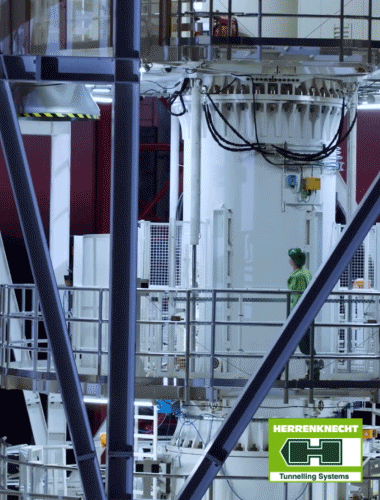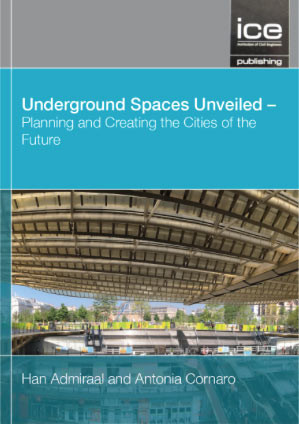Underground space for cities of the future Aug 2018
How has the use of underground space shaped the cities of today and how should and could it shape more efficient and resilient cities for the future – these are the drivers of the Committee on Underground Space of the International Tunnelling and Underground Space Association (ITACUS) and the subject of a recently published book co-authored by the Chair and Co-Chair of the Committee, Han Admiraal and Antonia Cornaro titled Underground Spaces Unveiled.

Examination of how underground space has shaped the cities of today and how it can be better integrated for cities of the future.
“The actual use of underground space varies from virtually non-existent to ever increasing application,” explained Admiraal, “and the latter brings forth its own challenges in often uncoordinated and unrecognised autonomous development leading to severe congestion of underground space and the blocking of future development. ITACUS has been setup to address the issue of underground space use worldwide and to raise awareness with regard to both the actual use and planning for future use of underground space.”
In recent years, one of the main objectives of the Committee has been to reach the widest possible audience in its efforts to promote the integrated use of underground space in urban planning and development and to work with professionals in associated professions including urban planners, decision makers and owners of underground space as part of their system operations. This has lead to close associations with
- ISOCARP, the International Society of City and Regional Planners;
- ICLEI, the Association for Local Governments for Sustainability;
- IFME, the International Federation for Municipal Engineering;
- ACUUS, the Associated research Centers for the Urban Underground Space
- Real CORP, the Competence Center of Urban and Regional Planning and Association for Promotion and Research of Urban Planning and Regional Development
- UNISDR, the United Nations International Strategy for Disaster Reduction; and
- UNHabitat, the United Nations Human Settlements Programme;
“Through our work with ITACUS, we have recognised that the promoting the more effective use of underground space requires the combined and collaborative attention, concentration and knowledge-sharing of all associated professionals,” said Cornaro. “Urban planners, geologists and engineers need to work together to unlock the knowledge to make the right decisions.”
Cornaro, who herself is a professional urban planner, adds: “Unplanned exploitation of underground space has in many cases led to subsurface chaos for long established conurbations, with little room for future expansion. The ‘first come – first served’ principle that has applied for so long, is now adversely affecting the needs cities have for optimising their spatial development. On the other hand, many, many cities of the world are yet to look below the surface for future expansion and this is where there is real potential for a truly integrated approach to urban development.”

Young professionals invited to Think Deep
In publishing their book, Cornaro and Admiraal speak to urban planners, urban designers, architects, geologists, engineers, and for policy and decision makers, to unveil the underground dimension as a hidden urban asset to provide solutions for many of the challenges faced by cities now and into the future. It charts the history of how existing underground and the impact of its construction has shaped cities of today and how the underground dimension can be better integrated and utilised for more efficient and sustainable cities of the future.
To advance its work, ITACUS, in collaboration with ISOCARP, has developed a Think Deep initiative to harness the imagination and expertise of young interdisciplinary professionals to ensure that underground space is integrated into the development of future urban planning. As well as its international Young Professional Think Deep Programme, Think Deep groups have been established in member nations of the ITA.
One of the most active of the national groups is the Think Deep group of the UK (TDUK), which reported recently on three workshops over the past year that studied:
The results of the workshops, that included built-environment professionals including urban planners, architects, lawyers, geotechnical engineers, tunnellers and geologists, raised the profile of the underground space dimension and provided a wider perspective and approach to the traditional approach to urban panning and ensured an awareness of the underground and its inclusion in discussions to solve existing problems and develop new strategies for the future.
In the coming months of 2018, ITACUS and the Think Deep groups will contribute to the proceedings of the ISOCARP World Congress in Bodø, Norway from 1-5 October 2018 and to the Global Engineering Congress to be hosted in London by the Institution of Civil Engineers (ICE) from 22-26 October 2018.
ITACUS and the Think Deep groups also contributed recently to the proceedings of the World Tunnel Congress in Dubai, UAE in April 2018; the ninth World Urban Forum (WUF9) in Kuala Lumpur in February 2018 and held workshops in association with conferences in Montreal, Canada; Vienna, Austria; Wroclaw, Poland and Bogota, Colombia. The enthusiasm and energy generated in different parts of the world by these activities has done more to raise the profile of the existence, awareness and beneficial use of underground space as an asset, rather than an operation of last resort, than other initiatives striving for the same objective over the last decades - both among professionals and the general public. Underground space and its development is coming out from shadows and into main stream infrastructure engineering.
Much of this awareness is generated also by the new book Underground Spaces Unveiled by Admiraal and Cornaro. Copies of the book are available for purchase from the book's promotional website and from the ICE Bookshop.
Those interested in joining the Think Deep programme can find details at the ITACUS website.
References
- Thinking deep to add another planning dimension – TunnelTalk, August 2018
- In search of resilient cities – TunnelTalk, January 2018
- VIDEO: ITACUS presentations at WTC2012, Bangkok, Thailand – TunnelCast, May 2012
|
|
|
|
|
Add your comment
- Thank you for taking the time to share your thoughts and comments. You share in the wider tunnelling community, so please keep your comments smart and civil. Don't attack other readers personally, and keep your language professional.



